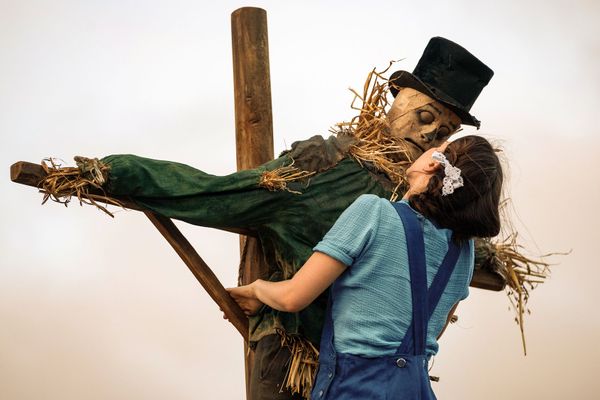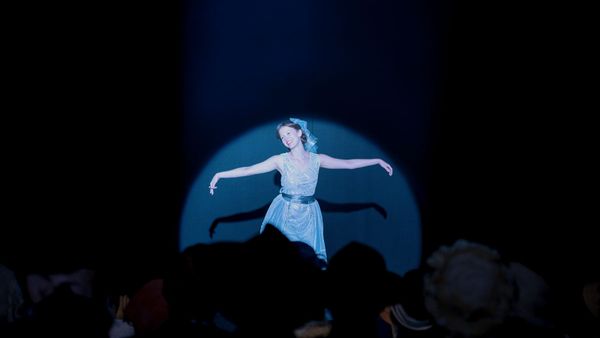
Writer-Director Ti West's "Pearl" is a brave, fun, and disturbing horror film that is simultaneously an homage to the Golden Age of Hollywood and a darkly comedic, irreverent, powerful psychodrama. It's a testament to the director's love of cinema.
"Pearl" is the prequel to West's earlier 2022 slasher flick "X" – both of which were shot back-to-back secretly. "X" follows Mia Goth as aspiring porn star Maxine who attempts to shoot a film in 1970s rural Texas with her friends before a series of killings derail the production. The murderer is revealed to be a woman named Pearl – an octogenarian who is driven by a violent hunger for youth and sex, and whose story is now told here.
Who is Pearl? What combination of circumstances created her? Is the monster made or is it born? Both?
Ti West answers these questions in "Pearl," set in 1918, which once again stars Goth, this time portraying the origins of how this farm girl became a killer. Pearl wants to run off to Hollywood. Her mother wants to stop her. There is great evil in Pearl. The tragic monster emerges and unleashes mayhem and destruction.
Here, West combines the aesthetic conventions and tropes of late 1920s and 1930s Hollywood films – the soldier husband away at war, a young woman seeking escape through dreams of fame and fortune, and a Technicolor palette, among others – with the contemporary sensibilities of a self-aware horror movie. The film's impact also hinges on Goth as she conjures a transcendent performance as the villain, which comes to a crescendo with a show-stopping nine-minute monologue. An upcoming third film, "MaXXXine" will round out the trilogy.
In this conversation with Salon, West reflects on the wild journey of making these films, crafting the aesthetically ambitious prequel and Goth's killer performance.
The following interview has been edited for length and clarity.
What has the journey been like? How are you feeling?
A little tired, but overall, I'm feeling pretty good. I had this crazy goal to make two movies back-to-back and have them come out in the same year. Thanks to A24 and the hard work of so many people we were able to make that happen. Both "Pearl" and "X" have been received very warmly by the public in a way that has exceeded my expectations. It really has been a pretty wild ride.
Is it surreal when you get what you want in this business? How are you managing such a rare and lucky thing?
"'Pearl' is going to be a defining part of [Mia Goth's] career. "
Yes, it is a bit surreal. But that feeling is balanced by the fact that the amount of work has been so extreme to make two movies back-to-back that I have not really had a moment to think about it all. I have been immersed in making these movies and promoting them. I have not had a day off in two years. The upside of that is I have not had a moment to really stop and get freaked out by any of it. In the end, I feel so very grateful to even have the chance to do this. Things are going according to plan for the most part and that does not happen that often.
What is your confidence level like now given the success of "X" and now "Pearl"? You have gone from independent films to mainstream success in a relatively short amount of time. You put in the work to make that happen. You helped to create your own luck as they say to be in the position to take advantage of it.
One should not ignore that success, whatever that means, is a result of good timing, luck, and hard work. But if you aren't in a position to take advantage of the good fortune when it shows up then it mostly means nothing. Again, that is the importance of putting the work in. I try to be as appreciative as I can. From a craft standpoint, I felt like "X" was very sharp. I had done 17 episodes of television over five years and that really helped me. I felt ready to do something that reached a little further than maybe some people were expecting.
But you should not rest on your past successes because each movie becomes more difficult. You just keep moving the goalposts and raising the bar, because if you don't do that, then you will regress, go backwards. Inevitably, everything that's coming after "Pearl" is going to be harder. Hopefully, that will just make me and the other folks who I worked with on "Pearl" even better at what we do.
While watching "Pearl" the first time, I had a moment of realization that you are utterly committed to this vision no matter what. I said to myself, "This film could be the end of him in terms of Hollywood and mainstream success." It was both uncomfortable and exhilarating to see such obsession. You are utterly committed to your vision for "Peal" no matter what. Where did that come from? The second thought I had while watching "Pearl" was that Mia Goth is a star.
Once you commit to an idea and certainly a film then you can't second guess yourself. You just have to lean into what you're doing. I so appreciate what you said about Mia because our very first Zoom meeting I felt the same way. That paid of with "X" and now "Pearl." Mia is the perfect person to partner with for these films. Every day on the set it was a real pleasure to watch her excel in these roles. It won't even be an argument. "Pearl" is going to be a defining part of her career. To be part of that felt really special and important.

Film is a series of choices. To that point you made many bold decisions in "Pearl" where others would have softened things, flinched or retreated. For example, you didn't have to have the scene with Pearl having sex with the scarecrow. You didn't have to have the murders take place in broad daylight. You didn't have to actually show the stag film. In the end, you pulled no punches.
"The aesthetic of the movie [was] ... an odd childlike, almost Disney-esque wholesome world that is used to tell a demented story."
I think a lot of that was just a commitment to Pearl the character. When we made "X," Mia and I spent a great deal talking about the backstory for Pearl. We don't meet her until late in her life. We don't learn a lot of specifics about her. But I wanted to know all those things in case Mia asked me questions. Those answers were important for Mia to create Pearl. As we developed the "Pearl" movie, we just tried to be as authentic and truthful to her character as possible. The character may be a little out there. She is unwell. The real goal was to put the audience into Pearl's perspective so that you could empathize with her. This is a movie told from Pearl's point of view.
For example, when Pearl goes to the dance competition, you're really rooting for her despite some of the horrible things she's done. You can look past it because it's Pearl's movie and we're just along for the ride with her. I don't want the audience to laugh at Pearl or feel any way about her other than admiration for her efforts. That was not easy to create as a filmmaker. Moreover, that was made even more difficult by the aesthetic of the movie, which is this obvious theatricality, the golden age of Hollywood, and an odd childlike, almost Disney-esque wholesome world that is used to tell a demented story.
I wanted "Pearl" to feel classic but to also have modern sensibilities. In the end I believe that we accomplished that with "Pearl." I do feel like "Pearl" is a new way to tell an old story. It was all just very exciting.
"Pearl" is an example of pastiche with its late 1920s and 1930s Technicolor "Golden Age of Hollywood" filmic and aesthetic sensibilities combined with horror film conventions and psychological drama and character study. In that way, "Pearl" is a Technicolor dream made into a nightmare. There are also the narrative tropes and conventions of old Hollywood with the soldier away at war, the big dance competition, the girl stuck on the farm, the seduction of the innocent, the dreams of fame and reinventing the self by being in front of the camera, etc.
But that same pastiche and your choices about story and style can also be limiting too. How did you maintain the balance where the pastiche and other aesthetic and narrative choices and sensibilities did not hamstring the story?
We always knew that the climax of the movie was going to be a close-up. "Pearl" is larger than life and full of pastiche and aesthetics that are loud, so to speak. The close-up of a woman's face would reveal her deepest feelings and thoughts. If we got it right that final shot would take away any feeling that the ending wasn't earned and real.
The close-up of Pearl's face at the end of the film brings the audience back to the psychological journey and pain and angst of the character. The ending is serious. It grounds the film and that was always the plan. There is something very relatable about the pain that Pearl is experiencing. Most people have some part of them where they wished that their lives were different and that they had made other choices. Dreaming of that alternate life through the movies or other media and fantasies. The isolation and loneliness of COVID. Obsessive desires. Regrets and angst more generally. That is who Pearl is.
How did Mia Goth help to make the character Pearl real?
Mia Goth is the X factor of "Pearl." Sure, I can write whatever I want. We can create some type of archetype. But in the end, it was Mia who took that performance to such a real place and created something truly genuine. People are enthralled by Mia's performance. I saw it. I felt that way from when we first met and decided to collaborate on "X." The character of Pearl is really an opportunity for Mia to shine in a way that most people were not expecting.

"Pearl" is darkly humorous. It is a horror film too. It is a psychodrama. There are also these camp elements. You've got so many things going on at once. How did you make those elements cohere in a compelling way?
That is what we set out to do. I'm glad the film is hitting those notes. I can't specifically tell you how we made that happen. It isn't something functional or mechanistic or directly causal where we do "x" and then "y" happens with a film. Film does not work that way in terms of the totality of what we create. One has an idea, they follow through on it, and then we hope that people will connect with it.
Yes, there are choices . . . but those choices create something that you're not always aware of. As a practical matter, which one of the hundreds of choices along the way was most responsible for the final result?
The humor is just my taste asserting itself. The pastiche of the movie helps to create a contrast with the disturbing and bizarre subject matter, the humor, the horror genre conventions and rules where in the end it all comes together coherently for the film. It is bizarre, and there's something that is darkly humorous about that. I am sure that there are some people who could watch "Pearl" and be like, "This isn't funny at all. This is horrible." But I think that if you're really in tune with the movie then you sense the irony.
Yes, what is happening in "Pearl" is horrible. It is a horror movie after all. But it is also funny and relatable and charming in its own way too. When people laugh during "Pearl," I also believe that is because of a feeling of experiencing a guilty pleasure. You aren't supposed to laugh at such horrible things. Yet, you do in the context of the movie. That is one of the great things about art. It stimulates a reaction in people they may not have expected.
While watching "Pearl" I also kept thinking about "The Rocky Horror Picture Show." "Pearl" hits on so many registers at once it could easily become a cult classic. The camp elements alone could put it in that conversation. Who is the target audience for "Pearl"?
The ideal audience is those people who love the movies and the experience of cinema. Those are people like me. I love your suggestion that "Pearl" could be viewed as a "Rocky Horror"-type movie – and I mean that in the best spirit. I knew that "Pearl" was something different and out there. We sensed that when we were making it. I hope that "Pearl" endears itself to people because there isn't anything out there like it. That uniqueness is what is fun about a movie like "Rocky Horror." Such movies are cult classics because they are so very special.
If "Pearl" becomes part of that conversation, it would be a feather in my cap. As someone who loves movies, I also hope that the style and aesthetic of "Pearl" will spark a curiosity in younger people and other viewers too, who may not know much about "old-fashioned" cinema. They may find something new to appreciate, and as someone who loves movies it is a great thing when we can spark a conversation and curiosity about movies, why we like them, the craft and the art. For me that is a real win.

Given "Pearl's" influences, what would be some other movies that you would recommend for viewers?
The Golden Age of Hollywood certainly does have a unique vibe to it. There's a theatricality and audaciousness to those movies that doesn't really exist anymore. That includes everything from "Singing in the Rain" to Douglas Sirk movies and of course "Wizard of Oz", the latter being an obvious influence on "Pearl". "Red Shoes" is also a really beautiful and brilliant film. One of my favorite things to do is to put on Turner Classic Movies. When I am traveling and finally get to the hotel that is what I do.
Those classic Hollywood films are presented as such. You're not watching something modern and of the present in terms of cinematic conventions. The suspension of disbelief works differently. When you watch one of those classic films you are watching people perform in a movie, in a self-aware way, who are exercising their craft at a high level. I find something very comforting and beautiful about that.
Pearl is a very complex character. How did Mia summon her? Channeling such intensity and energy can take a great deal out of a person on a physical, emotional, psychic, and spiritual level. How is she doing?
Mia is doing great. She's having a great time. She's very happy when we did that scene. My directing mostly involved just getting the hell out of the way. The writing was on the page. I knew what Mia was capable of. We didn't really rehearse it that much. We ran a portion of it at some point on a weekend just so she could show me that she knew all those words. That wasn't acting though. It was just a reading of the line to make sure she had memorized all the words.
Once we pointed the camera at her face to film the final scene I felt fine. She gives 110% to everything. I knew that when the time came, she would just bring it. I didn't know what was going to happen. But I knew that we just had to clear a path for her. We actually shot the close-up from when they walk into the room, sit down and they start talking. There's a monologue, and then they get up and they leave. We shot the whole thing all the way through. It was probably a 15-minute take. In the middle of that 15 minutes there was an unbroken six minutes.
The goal was to just focus on her face the whole time. If anything had gone wrong on the set, it would need to happen before she started the monologue. It was almost like filming a stunt because if anything went wrong then we would have to go all the way back to the beginning and start over. For those 15 minutes we all had to be hyper-focused on the set to ensure that Mia could channel something transcendent and that is what she delivered.
"Pearl" is currently in theaters. Watch a trailer, via YouTube.







